Is Airsoft Legal in Canada? Essential Laws Guide
Hello, fellow Canadians! Today, I want to address a common question among enthusiasts of the popular recreational activity, airsoft: Is airsoft legal in Canada? As an avid airsoft player myself, I understand the importance of knowing the ins and outs of the laws surrounding this thrilling sport. So, let’s dive in and explore the essential laws and regulations governing airsoft in our great country.
Key Takeaways:
- Airsoft is legal in Canada and has gained immense popularity as a recreational activity.
- Games are typically held in designated areas such as specialized fields or arenas, with established rules and regulations for fair play and safety.
- Airsoft guns must not closely resemble real firearms and should meet specific velocity requirements to be considered legal.
- Age restrictions for purchasing and playing airsoft vary by province, with some provinces setting the minimum age at 18 years old.
- Bill C-21, a proposed legislation, could potentially impact the legal status of airsoft but is still under review in the Parliament of Canada.
Now that we’ve laid the foundation, let’s delve deeper into the regulations and guidelines surrounding airsoft games and equipment in Canada. Stay informed, stay safe, and get ready for some exciting airsoft action!
Airsoft Games and Playgrounds in Canada
Airsoft games in Canada take place in designated fields or arenas that offer structured environments with various obstacles and terrain features. These locations aim to simulate real-life combat scenarios, providing players with an immersive experience.
Within these airsoft playgrounds, there are specific rules and regulations in place to ensure fair play and maintain a safe atmosphere for all participants. These regulations are crucial for the smooth operation of the games and the overall enjoyment of the players involved.
One of the key aspects of airsoft gameplay is the emphasis on safety. Canadian airsoft safety guidelines prioritize the well-being of players and stress the importance of adhering to established safety measures. Protective gear, such as goggles, masks, and appropriate clothing, must be worn during gameplay to minimize the risk of injury. This ensures that participants can fully engage in the game while staying protected.
Moreover, teamwork and effective communication are vital in airsoft games. Players are encouraged to work together, strategize, and coordinate their movements to achieve their objectives successfully. By emphasizing teamwork, airsoft games promote a sense of camaraderie and cooperation among players, enhancing the overall experience.
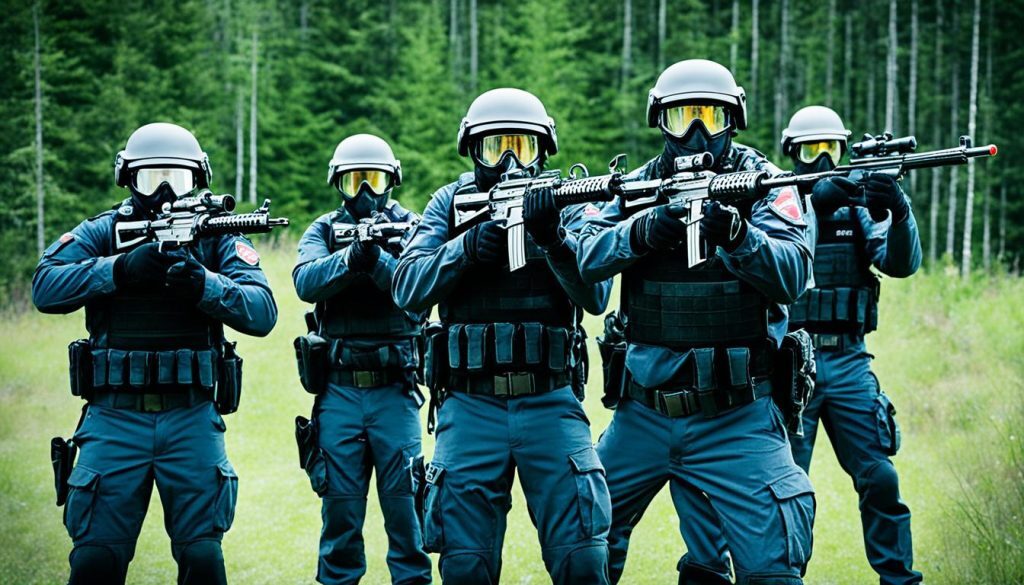
To maintain a safe environment for everyone involved, it is crucial for players to familiarize themselves with the specific airsoft shooting range regulations and guidelines of the field or arena they are playing in. These regulations may vary depending on the location and can range from velocity limits for airsoft guns to rules regarding engagement distances.
By following these regulations and using proper safety precautions, players can minimize the risk of accidents and injuries during airsoft games. It is essential to prioritize safety and respect the rules to ensure a positive and enjoyable experience for all.
Airsoft Guns and Regulations in Canada
Airsoft guns are a crucial component of the popular recreational activity in Canada. These replica firearms closely resemble real counterparts and provide participants with a realistic feel during gameplay. However, to ensure their legality, airsoft guns in Canada must not closely resemble real firearms and should have specific modifications such as different colors, markings, or decorative elements.
The appearance of airsoft guns is a significant factor in determining their legality. These modifications help distinguish them from real firearms and prevent potential confusion or misuse. It is important for airsoft enthusiasts to ensure that their guns comply with these regulations to avoid any legal issues.
Additionally, airsoft guns in Canada must meet specific velocity requirements. They are required to have a minimum velocity of 366 ft/s and a maximum velocity of 500 ft/s to be considered legal for possession and use. These velocity restrictions aim to maintain a safe environment during gameplay and limit the potential for serious injuries.
Importing airsoft guns into Canada requires compliance with these regulations as well as careful consideration of the specifications and characteristics of the gun. It is advisable to review and verify the compliance of the airsoft guns before importing them to avoid any customs-related complications or legal consequences.
Overall, being aware of the airsoft gun restrictions in Canada and understanding the regulations surrounding their appearance and velocity is essential for airsoft enthusiasts. By adhering to these regulations, participants can enjoy the sport safely and responsibly, while also promoting a positive image of the airsoft community in Canada.

| Type | Legal Requirements |
|---|---|
| Pistols | Must not closely resemble real firearms Must meet velocity requirements |
| Rifles | Must not closely resemble real firearms Must meet velocity requirements |
| Shotguns | Must not closely resemble real firearms Must meet velocity requirements |
| Sniper Rifles | Must not closely resemble real firearms Must meet velocity requirements |
Age Restrictions for Airsoft in Canada
When it comes to participating in airsoft activities in Canada, age restrictions vary depending on the province. In provinces such as Quebec, Ontario, Saskatchewan, Manitoba, and British Columbia, the minimum age to purchase an airsoft gun is typically set at 18 years old. However, it’s important to note that parents or legal guardians can purchase airsoft guns for their children.
Outside of these provinces, there is no specific minimum age requirement set by law. However, it is essential to check with local retailers or authorities to ensure compliance with any age-related regulations that may be in place. Individual retailers may have their own age restrictions for purchasing airsoft equipment.
As for playing airsoft in Canada, the minimum age requirement is usually 18 years old. However, some airsoft fields may allow younger players to participate if they are accompanied by a responsible adult.
It’s important to be aware of and follow the age restrictions set by your province and local authorities when it comes to engaging in airsoft activities. This helps ensure the safety and well-being of all participants and promotes responsible gameplay.
| Province | Minimum Age to Purchase Airsoft Gun | Minimum Age to Play Airsoft |
|---|---|---|
| Quebec | 18 years old | 18 years old |
| Ontario | 18 years old | 18 years old |
| Saskatchewan | 18 years old | 18 years old |
| Manitoba | 18 years old | 18 years old |
| British Columbia | 18 years old | 18 years old |
| Other Provinces | Varies (check with local retailers) | 18 years old (unless accompanied by a responsible adult) |
Bill C-21 and Its Impact on Airsoft
One of the current issues that could potentially affect the airsoft community in Canada is Bill C-21. This proposed legislation aims to make amendments to existing laws related to firearms, and if passed, it could have significant implications for the legal status of airsoft in the country.
If Bill C-21 becomes law, one potential impact is that airsoft guns could be classified as firearms. This classification would subject airsoft guns to specific regulations and requirements such as licensing and registration. This change could significantly impact the airsoft community and the industry as a whole.
As of now, Bill C-21 is still being discussed and reviewed in the Parliament of Canada, so its final form and impact on airsoft are yet to be determined. It is crucial for airsoft enthusiasts and industry stakeholders to stay informed about the current status of the bill and any potential changes in the law.
Ensuring compliance with any future requirements, such as an airsoft license, is essential for maintaining legality within the evolving regulatory framework. Stay updated and engaged to understand the potential impact of Bill C-21 on airsoft in Canada.
| Proposed Impact of Bill C-21 on Airsoft |
|---|
| Classification of airsoft guns as firearms |
| Potential licensing and registration requirements |
| Effects on the airsoft community and industry in Canada |
Importing Airsoft Guns to Canada
Importing airsoft guns into Canada requires careful consideration of the legal requirements and specifications of the guns. To ensure compliance with Canadian laws, airsoft guns must meet specific criteria to be considered legal in the country. Firstly, they should not closely resemble real firearms and must have visible modifications such as different colors, markings, or decorative elements. Additionally, airsoft guns must adhere to specific velocity requirements, with a minimum of 366 feet per second (fps) and a maximum of 500 fps to be deemed legal for possession and use.
Before importing an airsoft gun into Canada, it is crucial to review the specifications and characteristics of the firearm to ensure that it meets the legal criteria. Some international companies may indicate whether their airsoft guns are suitable for the Canadian market, which can be helpful in ensuring compliance with the regulations.
As the importation of airsoft guns involves international shipping, it is essential to be aware of the legal requirements to prevent any issues at customs. The Canada Border Services Agency (CBSA) regulates the importation of firearms, including airsoft guns, into the country. It is advisable to consult the CBSA website or contact them directly for the most up-to-date information on the importation process and any necessary permits or documentation required.
When importing airsoft guns to Canada, it is critical to exercise caution and ensure compliance with the legal requirements. In doing so, enthusiasts can enjoy the sport of airsoft while adhering to the regulations set forth by Canadian authorities.
Playing Airsoft Safely in Canada
When engaging in airsoft activities in Canada, it is essential to prioritize safety by following Canadian airsoft safety guidelines and adhering to airsoft shooting range regulations. To ensure a safe gameplay experience, here are some key points to keep in mind:
- Wear Protective Gear: It is crucial to wear appropriate protective gear, such as goggles, masks, and appropriate clothing, to safeguard yourself from potential injuries during gameplay. These items are designed to provide protection and minimize the risk of harm.
- Follow Field Regulations: Airsoft fields or arenas have specific rules and regulations in place to maintain a safe atmosphere and a fair play environment. Familiarize yourself with these regulations and ensure that you adhere to them at all times.
- Emphasize Communication and Teamwork: Effective communication and teamwork are essential for safe and enjoyable gameplay. By communicating with your teammates and coordinating your strategies, you can enhance safety and prevent accidents.
- Adhere to Velocity Limits: Airsoft guns have specific velocity limits to minimize the risk of injury. It is crucial to use your airsoft gun within these legal limits to ensure safe gameplay and prevent unnecessary harm.
- Safe Storage and Transportation: When not in use, airsoft guns should be stored securely and transported in a responsible manner. Taking these precautions prevents accidents and ensures that the guns are only handled by authorized individuals.
By implementing these practices, you can play airsoft safely and responsibly in Canada, creating an enjoyable and secure experience for yourself and other participants.
Getting Started with Airsoft in Canada
If you are interested in getting started with airsoft in Canada, it is important to familiarize yourself with the legal regulations and guidelines for the sport. Understanding the criteria for legal airsoft guns, age restrictions for purchasing and playing airsoft, and any specific regulations set by your province or retailer is crucial.
Researching and choosing the right airsoft equipment is also vital for a safe and enjoyable experience. This includes selecting legal airsoft guns that meet the specific requirements, as well as investing in proper protective gear and accessories. By ensuring you have the right equipment, you can participate in airsoft games with confidence and peace of mind.
It is important to stay informed about any potential changes in Canadian airsoft regulations, such as the ongoing deliberation of Bill C-21. This proposed legislation could impact the legal status of airsoft guns in the country. Keeping yourself updated on the latest developments will help you navigate the regulatory landscape effectively.
If you are new to airsoft, seeking guidance from experienced players or reaching out to local airsoft fields can provide valuable insights and assistance. They can offer advice on equipment selection, gameplay strategies, and any additional local regulations that may apply to your specific area. By leveraging their expertise, you can start your airsoft journey on the right foot.
- Quebec Police Officer Salary Insights 2023 - July 13, 2025
- Canada Arrest Protocol: What Police Say Upon Arrest - June 12, 2025
- Can Police Disclose Who Reported You? Find Out Here - June 6, 2025
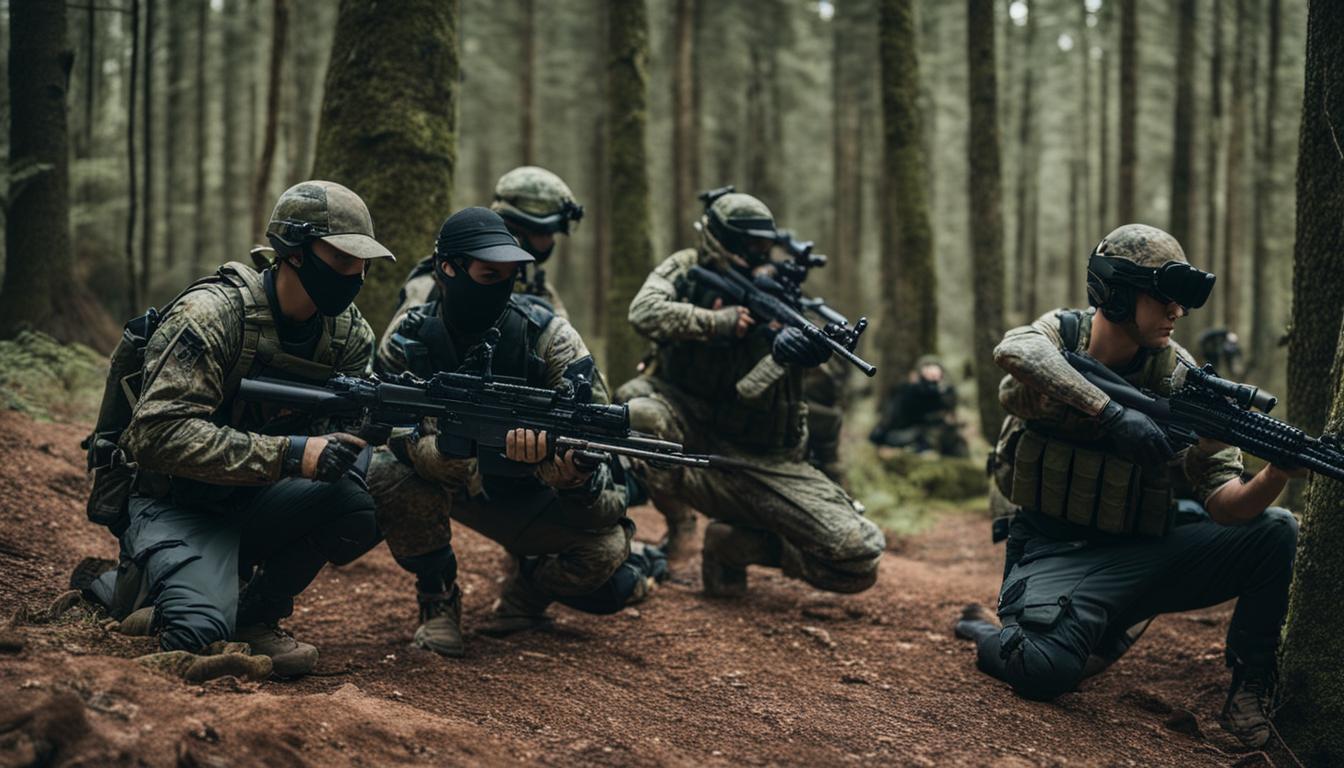


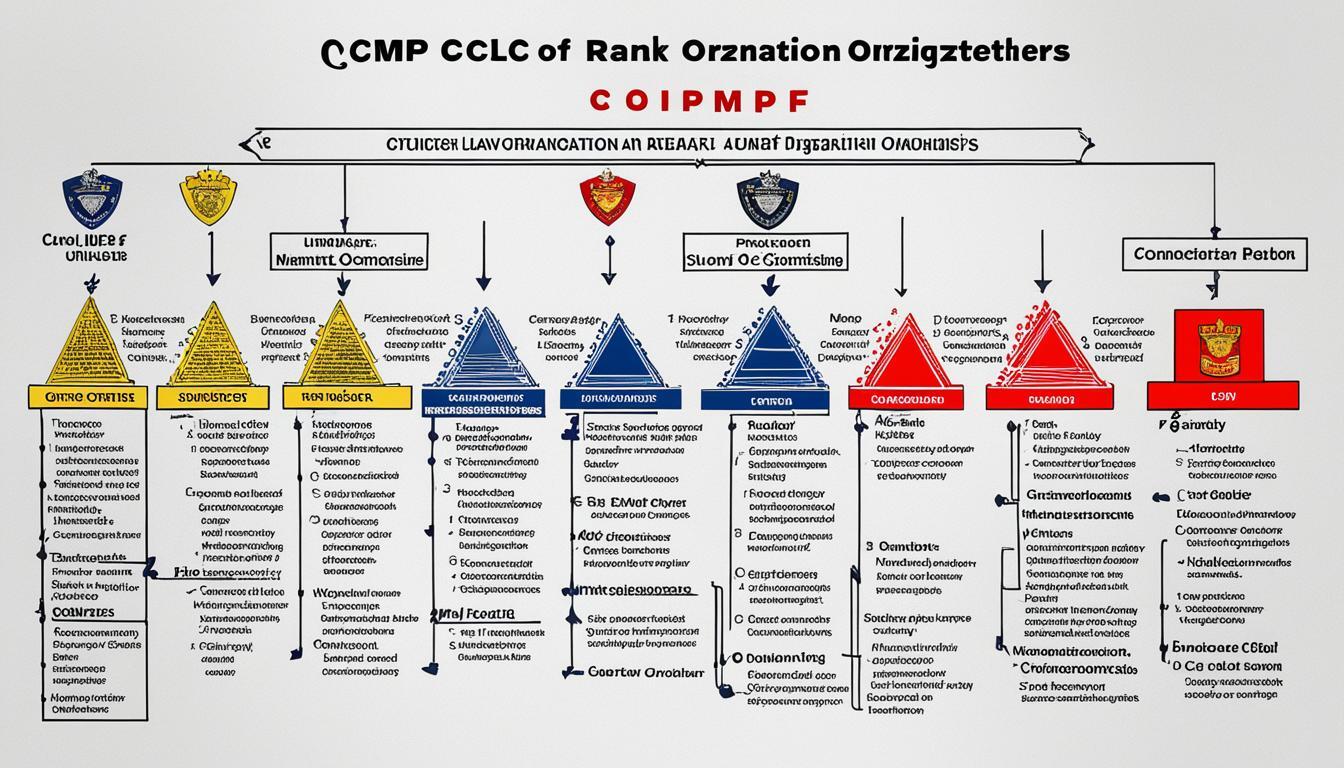
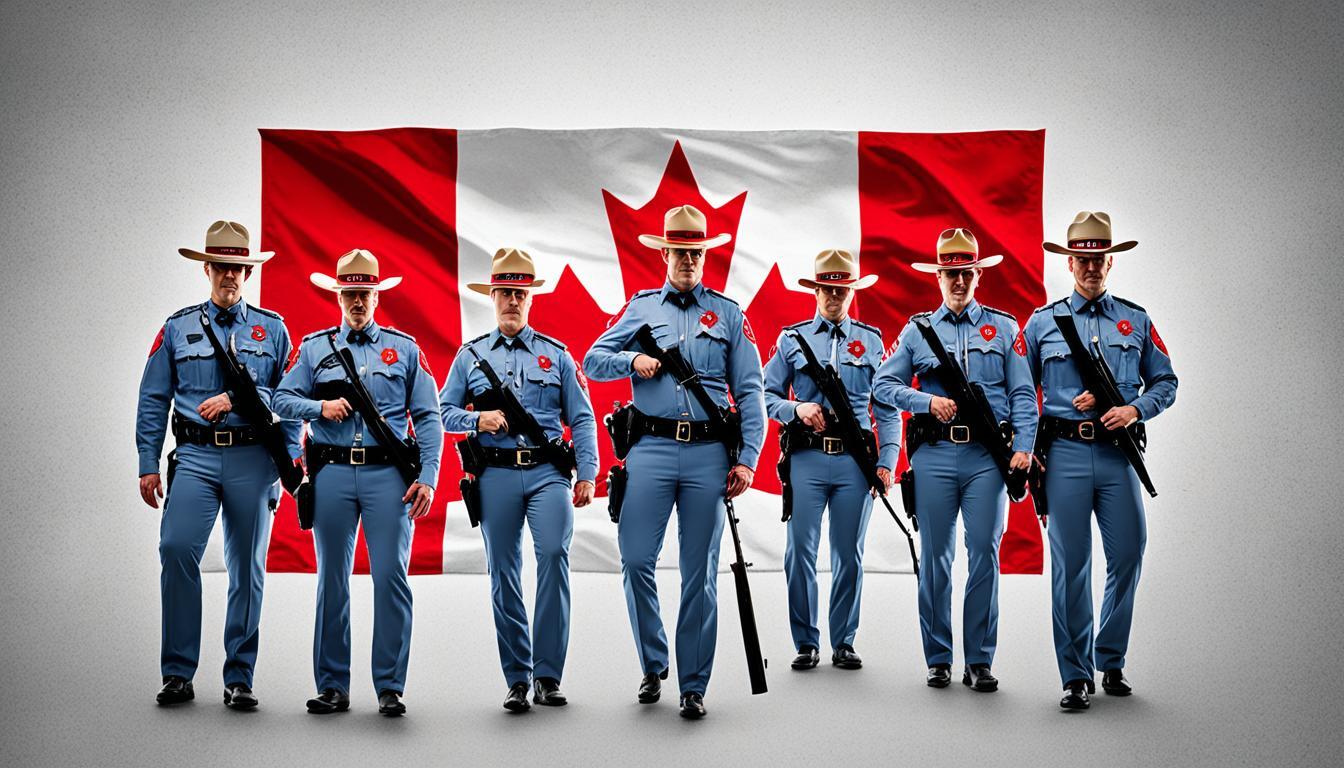
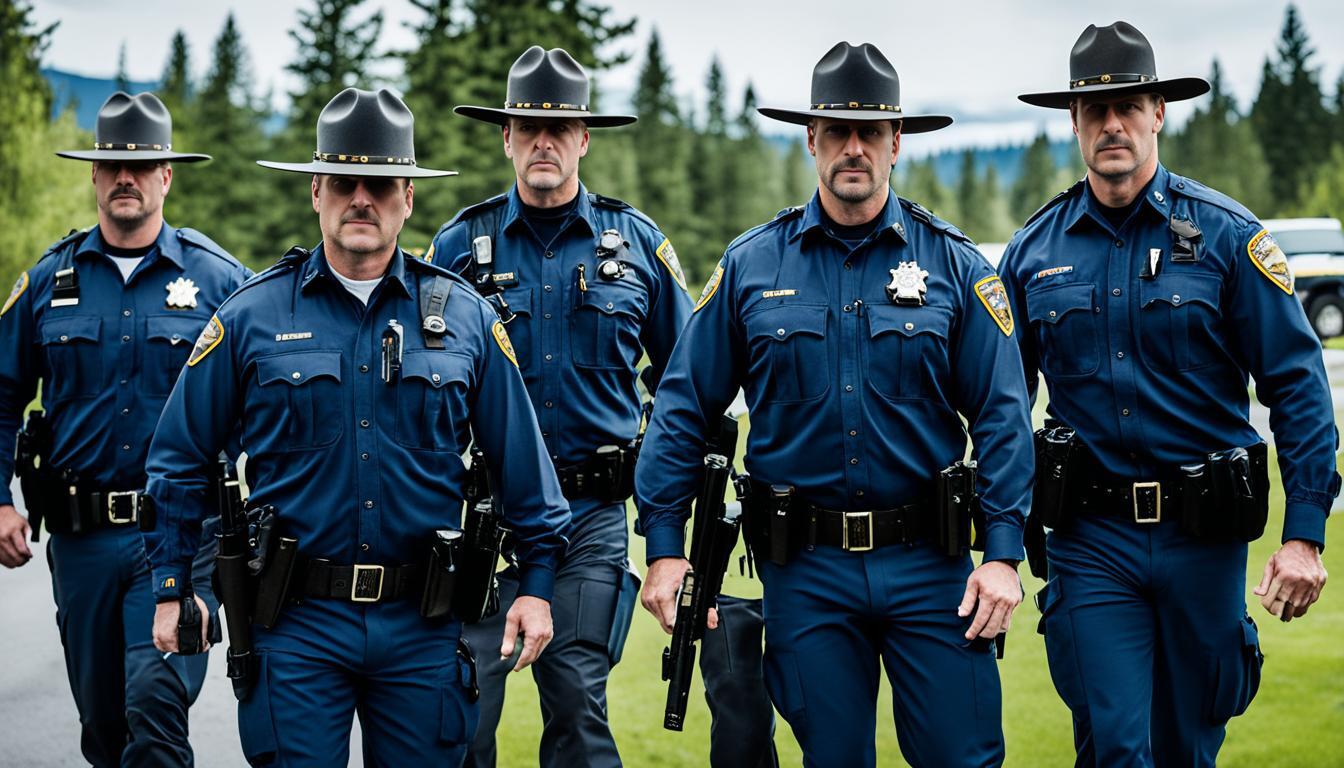
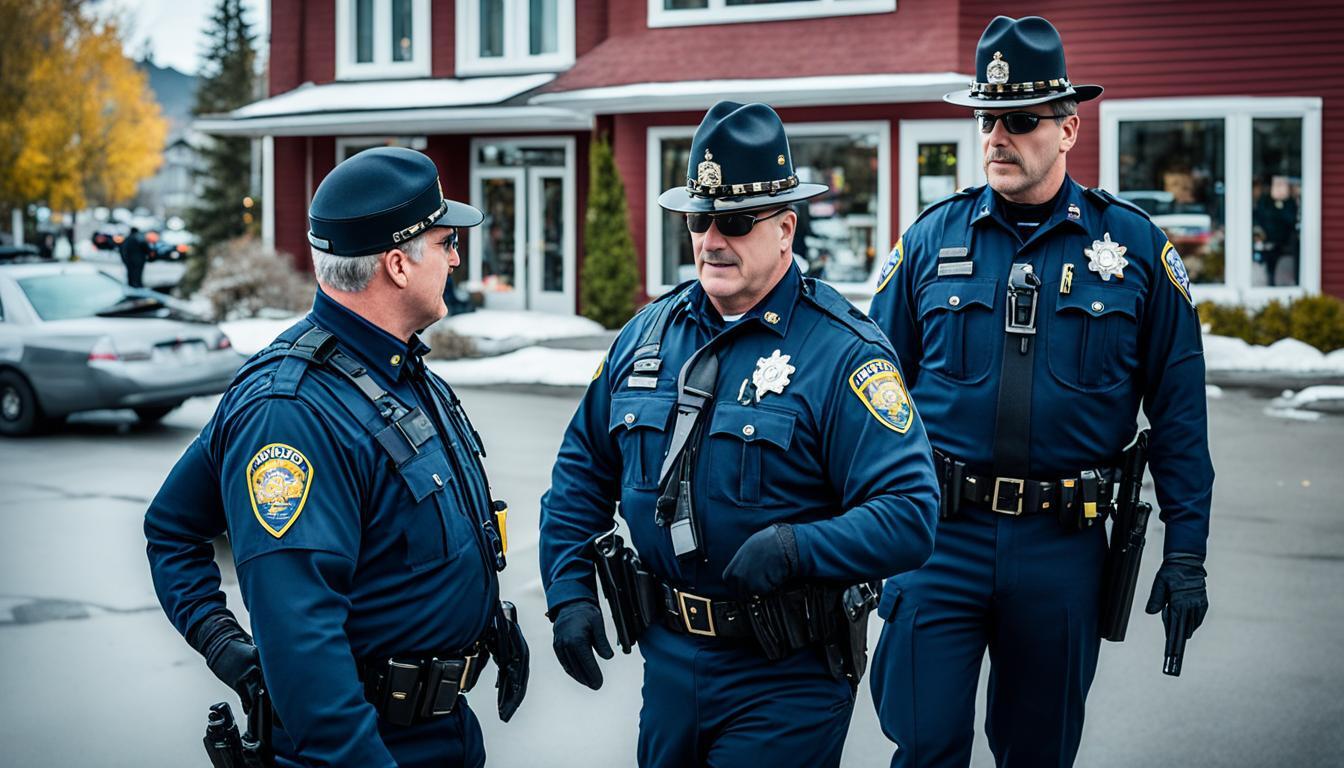


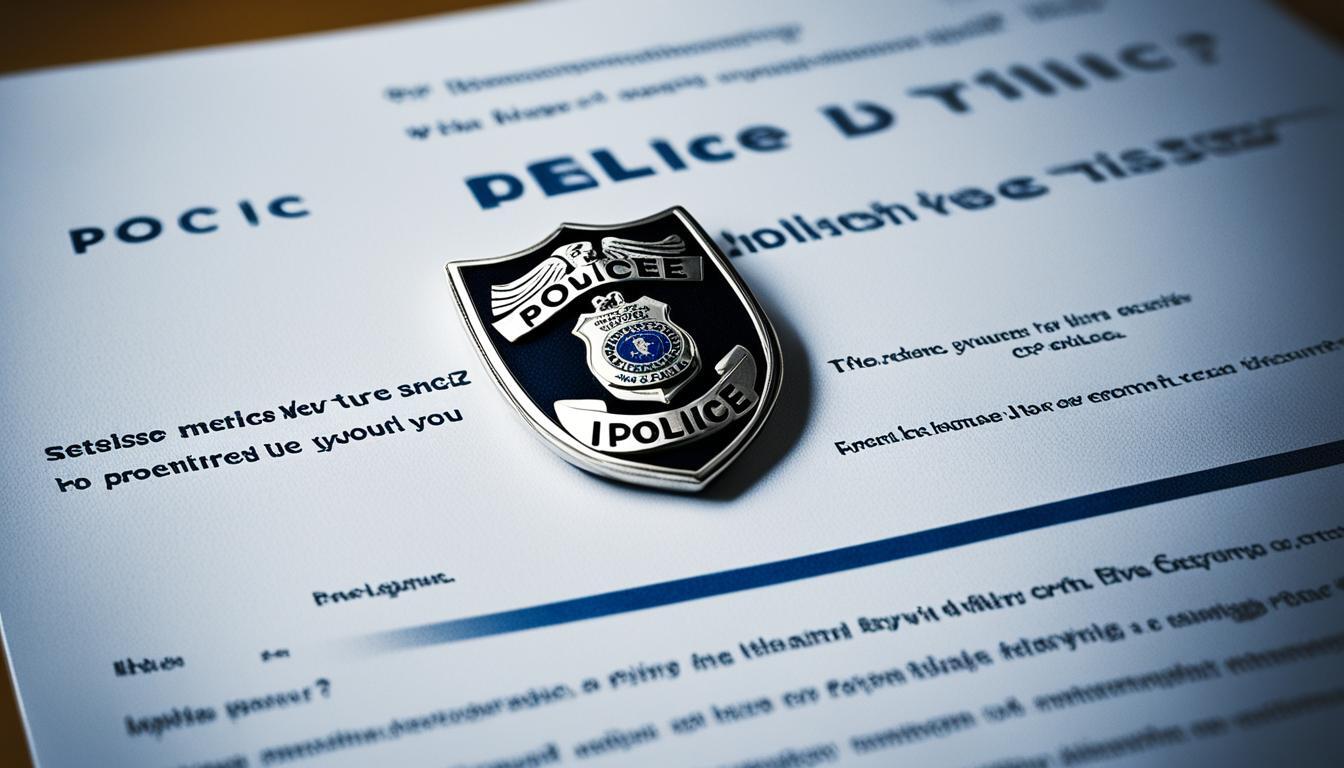










Post Comment